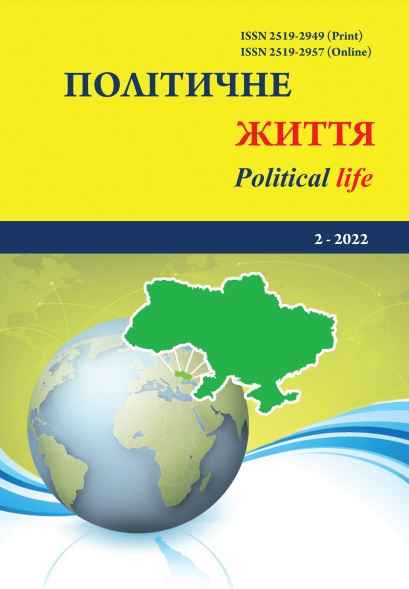The Russian-Ukrainian War through the Prism of Contemporary Critical Theories of International Relations
DOI:
https://doi.org/10.31558/2519-2949.2022.2.8Keywords:
critical theories; constructivism; feminism; postcolonialism; conflict between the Russia and the UkraineAbstract
The modern Russian-Ukrainian war is considered through the so-called postulates of varieties of the modern (critical, non-classical) theory of international relations: constructivism, feminism, postcolonialism, neo-Gramscianism. It is emphasized that this conflict is considered by the representatives of all the above-mentioned concepts of international relations. Among them, this conflict is most successfully and widely covered by representatives of constructivism, while representatives of other areas of critical theory cover this war less actively, in particular, compared to its analysis by representatives of classical concepts of international relations. At the same time, the older generation of constructivist scientists considers the conflict in eastern Ukraine as a proxy war between Russia and the West. Instead, this conflict is viewed as the Russian-Ukrainian war by the youngest generation of constructivists who are just engaged in science (D. Esmati, M. Rossi). Neo-Marxism, in particular, neo-Gramscianism, feminism, and postcolonialism in these conditions play an exclusively supporting role in the analysis of this conflict, interpreting some of its aspects. In particular, feminism draws attention to the main victims of this war (women and displaced persons). Neo-Marxism views the significance of this conflict for relations between Russia as a semi-peripheral state and Western states as a collective global hegemon. In turn, postcolonialism emphasizes that the prehistory and modern context of the Russian-Ukrainian war are largely due to the West’s ignored post-imperial nature of Russia-Ukraine relations and the corresponding worldview of its elite toward Ukraine and Ukrainians. However, it cannot be ruled out that updating the descriptive and explanatory tools of these three non-classical scientific concepts will allow them to more effectively analyze the current Russian-Ukrainian conflict, its preconditions, and causes, and thus better predict its dynamics and consequences.
References
Климчук І. І. Історія формування феміністського напряму в теорії міжнародних відносин Грані. Дніпро, 2013. № 11 (103). С. 124-130.
Климчук І. І. Особливості феміністичних підходів у сучасній політичній науці / Вісник Львівського університету ім. І. Франка. Сер.: Міжнародні відносини. 2007. Вип. 23. С. 48-55.
Копилов В. О. Антоніо Грамші: неомарксистська експлікація діалектики влади і знання. Гуманітарний часопис. Харків, 2005. № 4. С. 10-17. URL: http://nbuv.gov.ua/UJRN/gumc_2005_4_4 (дата звернення 10.01.2022)
Кузик П. Конструктивістська концепція А. Вендта: від критики «міжнародної анархії» до ідеї невідворотності світової держави Вісник Львівського університету ім. І. Франка. Міжнародні відносини. Львів, 2013. Вип. 32. URL: http://intrel.lnu.edu.ua/wp-content/uploads/2015/10/VLNU_Mv_2013_32_15.pdf (дата звернення 10.01.2022)
Кукарцев О. Ґрамшіанський поворот у теорії міжнародних відносин Гуманітарні візії. Львів, 2019. Вип. 2. С. 33-37.
Путін заявив про проведення спеціальної військової операції у зв’язку із ситуацією на Донбасі Інформагентство «Інтерфакс-Україна»: Події. 24.02.2022 05:45 URL: https://ua.interfax.com.ua/news/general/801079.html (дата звернення 01.05.2022).
Романюк Н. А. Еволюція підходів до розуміння гегемонії в теорії міжнародних відносин / Н. А. Романюк, М. Р. Пурій Актуальні проблеми міжнародних відносин. Київ, 2016. № 129. С. 34-47.
Шинкарук К. Конструктивістська парадигма в дослідженнях міжнародних відносин: сутність і перспективи розвитку Вісник НТУУ «КПІ». Політологія. Соціологія. Право. Київ, 2009. № 3. С. 173-178.
Danen B. Russia and Ukraine: A post-colonial perspective on the Ukraine-Russia conflict Leiden University, 2016. № 8. 36 p. URL: https://studenttheses.universiteitleiden.nl/access/item%3A2608459/download (дата звернення 10.01.2022)
Esmati D. Putin’s Latest Oblast: A Constructivist Perspective Journal of political inquiry. 2015. 31.03. URL: http://jpinyu.com/2015/03/31/putins-latest-oblast-a-constructivist-perspective/ (дата звернення 10.01.2022).
Mayerchyk M. Ukrainian Feminism At The Crossroad Of National, Postcolonial, And (Post)Soviet: Theorizing The Maidan Events 2013-2014 / M. Mayerchyk, O. Plakhotnik. 2015. URL: http://ekmair.ukma.edu.ua/ bitstream/handle/123456789/15481/Mayerchyk_Ukrainian_Feminism_at_the_Crossroad_of_National_Postcolonial.pdf (дата звернення 10.01.2022)
Merlingen M. A Neo-Gramscian Perspective on War in and Over Ukraine. 2016. URL: https://www.academia.edu/9677722/A_Neo_Gramscian_Perspective_on_War_in_and_Over_Ukraine (дата звернення 10.01.2022)
Onati I. A. Why did the conflict in Ukraine start? A realist and social-constructivist approach 2016. URL: https://projekter.aau.dk/projekter/files/239568100/Why_did_the_conflict_in_Ukraine_start_A_realist_and_soci al_constructivist_approach_Author_Ioan_Alexandru_Onati_Supervisor_Wolfgang_Zank.pdf (дата звернення 10.01.2022)
Opoka I. International Approaches to the Crisis in Ukraine Polish Journal of Political Science. Warsow, 2016. Vol. 2, Issue 2. P. 73-102.
Rossi M. Constructivism and Social Influence in the Ukrainian Crisis 2014. URL: https://www.academia.edu/19623362/Constructivism_and_Social_Influence_in_the_Ukrainian_Crisis (дата звернення 10.01.2022)
Sigurðsson Á. Lost in Annexation? The Causes of Russia’s Foreign Policy Choices in Crimea Anno 2014 / Árni Þór Sigurðsson: Lokaverkefni til MA-gráðu í alþjóðasamskiptum. – Reykjavík, Ísland: Félagsvísindasvið Háskóla Íslands, 2015. 163 p.
Sydorenko Sergiy Ukraine’s Road to Candidacy: Details of the Commission Plan to Move Ukraine Closer to the EU, European Pravda. Kyiv, Saturday, 19 March 2022. URL: https://www.eurointegration.com.ua/eng/articles/2022/03/19/7136258/ (дата звернення 01.05.2022)

